#go josefa
Explore tagged Tumblr posts
Text
ok. finally finalized the whodunnit semi fake-ish oc names. because if you give them normal names the first results are LinkedIn.
#Riadne Marie Resurrecion Ruiz-Thellps#Josefa Hiraya D.(e Nilad) Mapirak#Sebastián Marie M.(apuraw) Dulcamarez#Orquidea Haze#Leonardo Jacinto C.(oncepcion) Buwanhari#Eva Perigloam#I gave up on Orquidea and just gave her Lolita's fake surname. Thellps is a munckinland name to me <3#I gave up on trying to make eva's name sound like eventide so i just put peri and gloam together. but i like it. she sounds like a nerd#ocs#edit: Should I go with Ríadne as a spelling?...
0 notes
Text
A book counts 318 deaths due to police and far-right violence during the Transition
A total of 318 people died as a result of the actions of the security forces and/or far-right terrorism during the years of the Transition, according to Luis Puicercús, former anti-Franco militant, activist for historical memory, and writer in his latest work "Imborrables. Los afectados desconocidos de la Transición (1976-1983)".
In the 306 pages of the book, Puicercús recovers the names of 318 victims murdered between January 1, 1976 - after Franco's death - and December 31, 1983, a period that encompasses a Transition that, he points out, "was not as peaceful or as exemplary" as is often thought.
Among the 318 victims are the ones of the March 3rd massacre, the Atocha massacre - where 5 labor lawyers were gunned down in 1977 by an ultra-right commando - or the Lasa and Zabala case.

8 faces out of 318: F.J. Alonso (Nafarroa), Javier Ricardo Fernández (Tenerife), María Encarnación Ayúcar (Bizkaia), Josefa Jiménez (València), Jesús Fernández (Tenerife), Gustavo Muñoz (Barcelona), Belén Sánchez (Las Palmas), and Agustín Valiente (Almería).
In the eight years following Franco's death, there were 39 victims in 1976, 52 in 1977, 47 in 1978, 53 in 1979, 65 in 1980, 37 in 1981, 19 in 1982 and seven in 1983. All of them victims of police brutality and/or far-right terrorism.
Euskadi was the community with the highest number of victims in this period (107), followed by Madrid (49), Catalunya (43), Andalusia (22) and Nafarroa (16).
"Imborrables" is the tenth book published by Luis Puicercús, who in 2022 presented a compilation of 14,000 names of political prisoners during the Franco regime from the birth of the Public Order Tribunal (TOP) in 1963 to the amnesty law of 1977. The so called "soft dictatorship" ages. Go figure.
[x]
#euskal herria#basque country#pays basque#pais vasco#euskadi#spain#history#the beloved transition#that myth#tw police brutality#state terrorism#tw death mention
33 notes
·
View notes
Note
Hiya! I’m a bit new to your blog, but I’ve seen a lot about “Claude,” and I’d love to know more about that! Is he from an AU of yours or just an OC?
You know, I could draw a lot of parallels for canon (or pre-canon, in quantic Claude's case) characters to try and set a baseline.

But maybe it's better to just forgo all of that. Claudia isn't truly an "anti-Marinette" (whose main story got published almost over a year before the Paris Special, funnily enough), nor is she an "alternate Lila", or even extremely related to the 'quantic kids' version of Claude Haprele.
She's just.... Claudia.
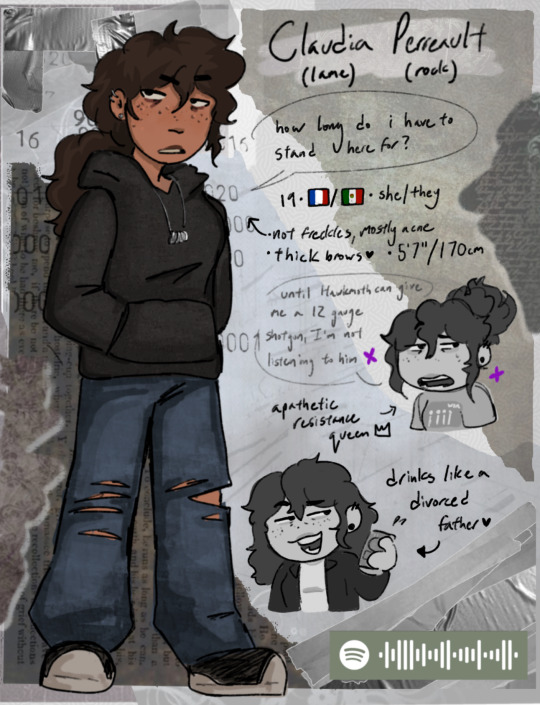
..full name Claudia Guadalupe Maria Josefa Lopez Cardoso Perreault. I have talked a bit about her starting concept and how she's grown from there, but to sum it up nicely, I was interested in how a much more pessimistic, apathetic character would function in the mlb world.
What if you were too bogged down by your own misery to even bother wanting to 'solve' your problems with an akuma?
What if your first instinct upon recieving a miraculous was to try and put yourself in danger?
In a world where feeling positively is survival and feeling negatively gets people hurt.... what if you feel nothing at all?
Claudia was meant to answer this by having a swarm of akumas that essentially functioned more as a mundane pest problem than anything else. She would just go about her day, largely unrelated to the bigger machinations of Paris, because that was not and never would be her issue,
.....until, uhm. well.
....So turns out she contrasts Adrien in a lot of interesting ways!

So, of course, I started to think about how they would work paired up together.
...A LOT.

whoops. Now, this is barely scratching the surface of Claudia as a character, I could get into her miraculous and how that works, the way tweos handles (or, really, gets around having to handle) its lovesquare (which I think would also be valuable for explaining claudia through her relationship with Adrien), and I could even talk about the changes to Adrien as a character! But I'll save those for other asks. :P
#thewarmembraceofshadow#claudia perreault#mlb oc#ml oc#miraculous fanfic#mlb art#miraculous ladybug#ml au#❮❮◈☈⚸♍︎➋➑
64 notes
·
View notes
Text
hahaha when was the last time i made a text post
uhhhhhrhhhdhh i just made a very evil au and its not even september yet (maybe thats a good thing
hi mexico happy very early birthday i love you and as a gift i am going to turn some of your guys evil
'traitor traitor au' or 'trading hearts with brutus au' or both combined somehow ,,, i dont know what to name it yet AHUUHHDHSGSG I guess I'll call it traitor traitor au for making tagging easier . for now. anyways basically a bunch of royalists become insurgents (the plan of iguala does not happen by the way) and a bunch of insurgents become royalists oh and also a bunch of other alternate universe things happen such as Guerrero starting on the royalist side (part of Gabriel de Yermo's 400 black volunteers) and Quintana Roo getting attacked by a flask of sulfuric acid (Leona Vicario's uncle threw it at him)
oh yeah and the gay sex that's pretty alternate universe... probably... it actually makes a certain iron dragon turn traitor which i find hilarious <- god of making unrealistic aus even if they try to stick to the historical setting
or maybe it is realistic to completely change which ideology ur fighting for because someone didnt want to fuck you and im just stupid . am i
?
hashtag vagueposting this tells you pretty much nothing about the plot huh
this is also very Allende vs Iturbide something something about fighting for Calleja's approval (and affection in iturbide's case
yeah Allende is evil now get wrecked white boy
Josefa Ortiz de Dominguez should be allowed to kill everyone in this au honestly starting with her cuck husband and then allende and then iturbide and then calleja and then
OKAY final thought for now . Venegas beats Calleja up with a crowbar near the end of the au story
Yeah this post is so unserious whatever!! im gonna be yelling about this stupid au it has consumed my thoughts and i dont know why because no other au does it like this one ., more rambles coming to you after i take a 9 hour flight!!!!! im coming back to the wretched america
#traitor traitor au#ship to history#boat of AUs#captains guard#mexicoposting#unanchored ted talks#uh#ignacio allende#agustin de iturbide#vicente guerrero#felix maria calleja#andres quintana roo#josefa ortiz de dominguez#francisco javier venegas#miguel dominguez#leona vicario#gabriel de yermo#there...
9 notes
·
View notes
Note
Encanto birthdays for your au ?
Warning: this answer is going to be a long one.

Mina Prepon= January 27th.
Honeymaren Nattura= October 25th.
Ryder Nattura= February 17th.
Elsa of Arendelle= December 22nd.
Anna of Arendelle= June 21st.
Kristoff Bjorgman= May 1st.
Fernando Madrigal Jogia= April 1st.
Rosa Yatra Salinas= January 8th.
Andre Botero Cepeda= March 10th.
Alba Molinari Merediz= March 5th.
Pedro Madrigal Yatra= January 1st.
Wilmer Rojas Torres= April 17th.
Machello Bécquer= August 4th.
Alma Botero Molinari and Valentina Valdez Valderrama= October 7th.
Chandice Rivas Guerrero= April 4th.
Alroy Rhenzy Espinosa= September 9th.
Señora Rosetta Guzmán= November 7th.
Alejandra Yee= June 10th.
Raimi Botero Molinari= February 5th.
Benito Madrigal Yatra= October 8th.
Beatriz Botero-Yee= February 21st.
Félix Espinosa Rivas= November 11th.
Miranda Botero-Yee= September 17th.
The Madrigal Triplets (Julieta Madrigal Botero, Josefa ‘Pepa’ Madrigal Botero, & Bruno Madrigal Botero)= October 17th.
Agustín Rojas Valdez= June 19th.
Gabriel Espinosa Rivas= January 4th.
Mariano Guzmán= February 14th.
Débora Guzmán= February 5th.
Inés Guzmán= July 21st.
Lydia Guzmán= July 1st.
Isabela Alma Rojas Madrigal= August 7th.
Dolores Espinosa Madrigal= August 31st.
Bubo Marquez= November 27th.
Luisa Rojas Madrigal= November 14th.
Cipriano Guzmán= June 22nd.
Faustina Madrigal Yatra= December 23rd-25th.
Ario Berra Ausentarse= January 16th.
Matias Guzmán= February 10th.
Yanamaria Maldonado Amaya= June 6th.
Mentiroso Esposito Sosa= August 8th.
Camilo Espinosa Madrigal= December 28th.
Alberto Guzmán= February 2nd.
Mirabel Rojas Madrigal= March 6th.
Antonio Bruno Espinosa Madrigal= May 21st.
Miguel Rivera= October 27th.
Socorro Rivera= November 12th.
Cesare Frollo= June 17th.
Araceli Peña Merlo= September 11th.
Amore Pugliese= February 29th.
Cornel Gaskit= November 11th.
Simon Cantor Acosta= July 7th.
Cyriacus of Troy= September 29th.
Madeline ‘Mad Maddy’ Meraxes Mim= July 30th.
Richard ‘Rick’ Ratcliffe= June 23rd.
Elmira Dorila Guzman Madrigal and Princesa Rosetta Guzmán Madrigal= April 9th.
Lin 'Gizmo' Mazorra and Haruto of Avalor= May 15th.
LeFou Deux ‘Lee’ Beaumont-LePrince= July 23rd.
Claudine Frollo= November 1st.
Christopher ‘Topher’ Thompson= December 18th.
Rachel Ratcliffe= January 5th.
The Marquez Madrigal Triplets (Zoey, Miguel Jr, and Arlo Marquez Madrigal)= May 11th.
Vidal Alfaro Pezmuerto= September 18th.
Oscar Candelario Guzmán Madrigal= April 2nd.
Mason Primethorn Gothel and Glendale ‘Glenn’ Hazel Gothel= March 14th.
Amelia Sadia Madrigal Prepon= December 31st.
Sofia Azucena Madrigal Prepon= January 1st.
Rolando Ortiz= March 16th.
Emilia Lydia Nattura Madrigal and Tito Krsitoff Nattura Madrigal= May 31st.
Rory Ratcliffe= July 4th.
Cailee Beckett= August 29th.
Becca Colyar= November 2nd.
Magnolia ‘Gigi’ Gothel= October 10th.
Théotime ‘Time’ Cogsworth= December 25th.
Annabelle Scorfano= February 29th.
Rosana Cardoso= March 20th.
Portabella Neverwing= June 24th.
Prince Diego of Cordoba= July 31st.
Felicidad Ruíz= September 22nd.
Ligera Juana Guzman Madrigal and Fuega Alba Guzmán Madrigal= March 20th.
Eleanor Bluefairy-Carmelo of Llyr= April 4th.
Carlos Manuel Madrigal Prepon= April 1st.
Wickley ‘Wick’ Wing= September 5th.
Leta Pepa Guzmán Madrigal= February 14th.
Belinda Nattura Madrigal= September 1st.
Hugo Jerónimo Madrigal Prepon= December 28th (Possibly).
The Rivera Madrigal Triplets (Mariana Isabela Luisa Rivera Madrigal, Marisol Carmela Victoria Rivera Madrigal, and Marcelo Héctor Bruno Rivera Madrigal)= October 25th.
Silvia Julieta Nattura Madrigal= June 12th.
José Lorenzo Madrigal Prepon= March 7th (he was born on his parents' wedding day).
Avila Brisa Marquez Madrigal= August 17th.
Dayana Noemí Espinosa Madrigal= April 20th (Possibly).
Laurencio 'Luis' Agustín Nattura Madrigal= January 23rd.
Vera Coco Rivera Madrigal= December 17th.
Amada Honeymaren Nattura Madrigal= March 15th.
Renata Imelda Rivera Madrigal= November 11th.
Giovanni Refugio Espinosa Madrigal= Considered to be August 20th, but the real date is unknown.
Juan Guzmán Madrigal= June 30th.
Javier Guzmán Madrigal= July 1st.
#frozen#encanto#descendants#disney descendants#melissa de la cruz#disney#descendants au#wicked world#disney descendants au#crossover fic#headcanons#invisible truth au#the invisible truth au#the invisible truth#etc
8 notes
·
View notes
Text
[Translated from Spanish]
'Louis, brother, you're already Mexican', Louis Tomlinson concluded his world tour in Mexico
COVERAGE. The British singer closed his world tour 'Faith In The Future' after 97 concerts in 39 countries, ending with three performances in Mexico and his renowned festival 'The Away From Home Festival'.
REGINA ORTIZ IN MÉRIDA

British singer Louis Tomlinson closed his Faith In The Future world tour with a flourish after 97 concerts in 39 countries, ending with three performances in Mexico and his renowned festival The Away From Home Festival.
On June 1, Tomlinson, known for his success "Just Hold On", performed at Curve 4 of the Autodrome Hermanos Rodríguez, becoming the first male soloist to offer a show in that venue, with a capacity of more than 70,000 spectators. The concert was broadcast live through the VEEPS platform, allowing its fans around the world to enjoy the show. In addition, the profits from the entrance fee were donated to the War Child UK organization.
Subsequently, the singer continued his tour in the city of Querétaro, where he offered a more intimate concert for 4,500 people at the Josefa Ortiz de Domínguez Auditorium.
Finally, Louis closed his world tour with a magnificent show at the VFG Arena in Guadalajara. The concert ended in a memorable way when a lucky fan took the stage to take a picture with the singer.
To conclude his time in Mexico, Tomlinson held his famous festival The Away From Home Festival in a warm sunset in the city of Mérida. The event was held at the Hacienda Susulá and was attended by artists such as Rodrigo Leal, Reverend & The Makers, Kevin Kaarl, DMA's, Dylan, Gibby and with an incredible closure, Louis Tomlinson.
Fans demonstrated their euphoria after Louis' departure and chanted the song "The Greatest". The singer also performed "Drag me down", "Night changes" and "Where do broken hearts go", songs from his old band, One Direction. Tomlinson expressed a deep gratitude to his fans for everything they have created.
It is worth mentioning that the relationship between Louis Tomlinson and his Mexican fanatics is undeniably special, as evidenced by the fact that the flag of Mexico has been the only one that the singer has raised during his career as a soloist, on three different occasions.
With this tour, it marks the end of the Faith in the Future World Tour and the beginning of its festival season, in which Tomlinson will participate in more than 15 events throughout the summer. Despite his career, this moment represents a milestone in his career and augurs a bright future.
24 notes
·
View notes
Text
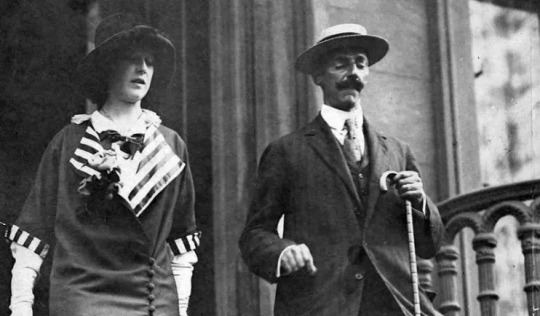

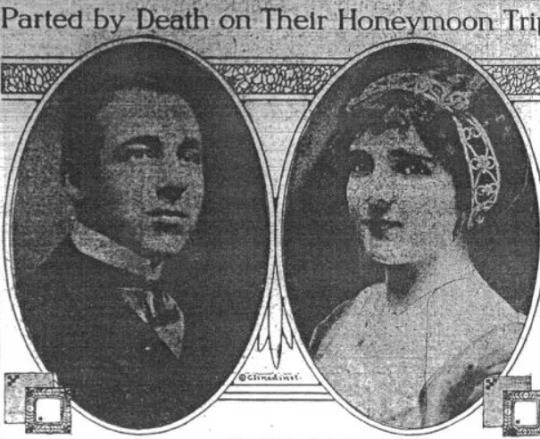


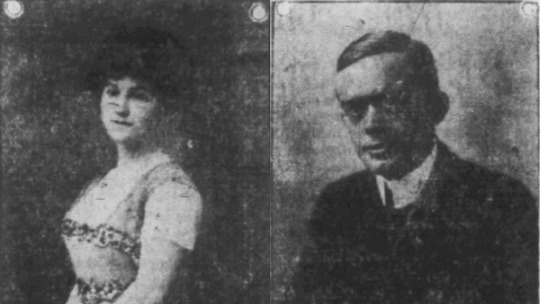
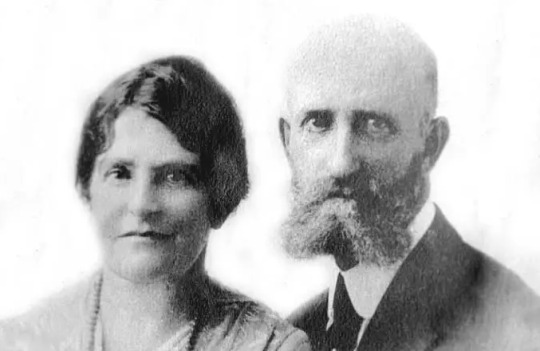
Apart from the Astors, there were at least 6 sets of honeymooners in first class. Daniel Warner Marvin, aged nineteen, son of the owner of the Biograph Cinema Company, was returning to America with his bride, Mary Farquarson, aged eighteen. Lucien P. Smith, aged twenty-four, of Huntington, West Virginia, had recently married eighteen-year-old Mary Eloise Hughes: she bore his posthumous son in December 1912. Victor de Satode Penasco y Castellana, aged eighteen, from Madrid, was going to America with his new wife Maria Josefa Perez de Soto y Valleja, aged seventeen. John P. Snyder, aged twenty-three from Minneapolis, was returning from his European honeymoon with Nelle Stevenson, aged twenty-two. Dickinson Bishop, heir to the Rounf Oak Stove Company, had married in November 1911, and embarked at Cherbourg with his wife Helen after a tour of Mediterranean Europe and Egypt. One newly married couple were both verging on the age of fifty: Dr Henry (or Hyman) Frauenthal, with a high-domed baldness and fulsome black beard, had married in France, as recently as 26 March, Clara Heinsheimer from Cincinnati.
Titanic Lives - Richard Davenport-Hines
#titanic#rms titanic#madeleine astor#Daniel Warner Marvin II#mary Farquharson#eloise smith#john jacob astor IV#lucien smith#Víctor Peñasco y Castellana#Josefa Peñasco de Satode#john snyder#nelle stevenson#Dickinson Bishop#helen walton#clara Heinsheimer#long live the queue
25 notes
·
View notes
Note
Hello, dear Josefa ✨
I hope you are doing well!
While Flower and myself were talking about our favourite couples of the napoleonic era, our conversation found its way to the Soults which we would love to group with couples like the Davouts or the Mortiers but can't because of the cheating on our monsieur le maréchal Soult's part.
With that in mind, we wondered: Do we know how madame Soult reacted to the cheating? How did her behaviour change through the first days, weeks, months after finding out? Did it even change?
We are aware that we don't know any details of the actual conversation where the couple discussed this matter but we still wanted to ask!
Thank you for your time and effort! c:
We do not really know, I fear. We do not even know when and how exactly she learned about Soult's little secondary Spanish family. It is quite possible that it did not come completely unexpected anymore, as people in Paris had been gossipping about Soult's alleged infidelities ever since 1810, and in one of his 1811 letters Soult kind of had admitted to a marital misstep.
If I remember correctly, Soult finally was granted permission to leave Spain by mid-February 1813, and could leave at the beginning of March. On his way through Southern France he took the occasion to go see his old mother in Saint-Amans, whom he originally had wanted to visit four years earlier, on his way into Spain. I do not remember (I'm not even sure if it is clear) if Louise and the kids already met with him in Saint-Amans or if they waited for him in Paris but I suspect they went to Saint-Amans and from there back to the capital that Soult reached at the beginning of April. He soon had to leave again, this time with Napoleon to Germany, on the 1813 campaign, and on 12 April he already gave full powers in all matters to his wife so she could handle affairs during his absence.
Did she at this point already know about the full extent of these affairs? It's likely, but we do not have any real clue.
She must have known by late June 1813, however (interestingly, that's the same time when, many miles away, Maria de la Paz Baylèn and her little baby son leave Spain and enter France). We know that because Soult in his letter fom 23 June at least vaguely hints at how hurt Louise must have been by his confessions. He invites her to come to meet with him at Dresden with their children, despite the fact that [...]
you will not be lodged very well, but you will be with me, your sorrows will cease, your cheerfulness will return, and you will be certain that, despite everything that has happened, you have never ceased to be tenderly loved [...]
"Despite everything that has happened" clearly means that by that point, Louise is fully aware of the existence of Maria de la Paz and her baby. And she had taken it badly, as was to be expected. Obviously, she doubted Soult's love for her, and she may have considered taking further steps, or at least that's something Soult feared:
I'm not talking about the other feelings, for nothing could add to their strength other than the step you're taking right now.
(All emphasis by me)
And then he continues to implore her to come and sit down with him and talk it all over.
So, obviously lots of trouble in honeymoon land. From the looks of it, I'd say Louise did not so much react with fury, but rather turned sad and depressed - which probably hit Soult far more. Her fury she apparently kept in stock for one French emperor to be used when she heard that her husband was about to be sent back to Spain again. But that's a different story 😁.
Thank you for the question, and I hope this kind of suffices, as it seems to be all information there is. (All quotes from N. Gotteri, "Le Maréchal Soult", as usual.)
30 notes
·
View notes
Text
Get to know your mutuals!
Tagged by @huchen-sohn 😎
What‘s the origin of your blog title?
It’s a little complicated. It’s a nickname that stems from my name. My name is Josie and my friends went from calling me Josefa to José, then Joe, then Josemann and then it became Hosemann, Hosenmann, Hose and now its Hosi :). (“Hose“ means “pants" in German and “Mann“ means “man“. Which is funny considering I‘m a woman 😎)
OTP(s)+ shipnames(s):
I‘m a shameless selfshipper. What can I say. Sevika x reader? I love to see it. I love to ship myself with Sevika and Ambessa as a poly ship. And I ship Sevika and Ambessa as well. I also ship MelJayVik because honestly, these three are perfect for each other and I LOVE it. Not a fan of caitvi since season two anymore, unfortunately…
Favourite color:
All kinds of purple but especially lavender. I like red and light pink, too.
Song stuck in your head:
There are a lot! Apple by CharlieXCX, Defying Gravity, Popular, Abracadabra and Disease by Lady Gaga.
Weirdest habit/trait:
I sit in childs pose (Pilates) on the literal edge of my bed scrolling on my phone, almost sliding off. Yeah. Thats comfortable to me. Can you tell I have autism/ADHD?
Hobbies:
I have been reading a lot, YES, BOOKS TOO, NOT ONLY “x reader“ SMUT! I play video games from time to time. Right now I‘m playing tomodachi life, hoping that with the new release they will add lesbians.
If you work, what's your profession?
I‘m an acting student 5th semester. Only one more to go! 😎 I hope I‘ll be able to perform on stage or be on front of the camera or do musicals or voice acting or… Honestly, I wanna do EVERYTHING.
If you could have any job you wish, what would it be?
Musical Actress! I love love LOVE singing! And dancing is becoming fun, too.
Something you're good at:
Singing and acting. I‘m getting better at dancing. I‘m good at cooking nice meals out of leftover ingredients.
Something you hate:
Men. Cishet men. The rich. Capitalism. The industry. The way democracy is getting rid of itself right now everywhere in the world. The way men still want to control women’s bodies. The racism, homophobia and transphobia that is on the rise right now. And the people who choose to look away.
Something you collect:
Trauma. Jkjk… I‘m collecting books right now, theatre plays to be exact.
Something you forget:
I don’t forget a lot anymore, I just lose things sometimes. Because of my ADHD I force myself to think about the things I have to do all the time so I don’t forget about them.
What's your love language:
Headbutting people like a cat, making weird ass sounds “mah“ “BAH!!“, physical touch I guess and words of affirmation.
Favourite movie/show:
Right now it’s Arcane. The voice acting is darn good. I‘m a huge fan of Ambessa’s voice actress. She has an interesting intonation style that makes her voice acting stand out from the rest without being unnatural. That is pure excellence!
Favourite food:
Ramen, I love me a good soup! Sushi, too, and cake. Red velvet cake, love of my life.
Favourite animal:
Cheetahs. People tell me a lot that I remind them of a cheetah. I also love parrots and other kinds of birds, fish are fun, too.
What were you like as a child:
My mom used to call me Rambo… I was very hyperactive and reckless, jumping off high places and branches or doing literal stunts.
Favourite subject at school:
English, any art class, German, history…
Least favourite subject:
Physics, but only because my teacher was a menace.
What's your best character trait?
Ambition, resilience, hard working, good humor I guess.
What's your worst character trait?
Choleric, cynical, impatient, I also panic quickly. I don’t know how to rest. If there is work I can do, I‘ll do it. I don’t know how to stop and work myself to the bone sometimes.
If you could change any detail of your life right now, what would it be?
If only I had more money, I would like to afford a peaceful apartment where I can rest and feel comfortable. And I want to start working in my business. And I would love to have time for a proper social life.
2 notes
·
View notes
Text
i lost my old pinned post so here we go again...



hi, hello!
i'm marion (or mari, or mimi, or mar, or mia, or... you see where i'm going with this, whatever is fine), i'm in my 30s and i use she/her pronouns
welcome to the online version of a magpie's nest where i keep all the shiny things i come across 🥰 it's a weird mishmash of all things i love (including quite a lot of different fandoms) in here, but i do try to tag despite the whole thing mostly running via my veeeeery long queue.
°˖✧˙ capricorn sun, scorpio moon, gemini rising. and yes, my full chart is as horrendous as that combo suggests.
°˖✧˙ i read (a lot), embroider (often) and write (although i complain about writing more than i actually do write). i occasionally post about grief but i post about cute animals just as much.
°˖✧˙ the beautiful little lamb painting on my sidebar is Agnus Dei by Josefa de Óbidos (ca. 1670-1684, oil on canvas)
now! for the sake of keeping things tidy:
links:
˙✧˖° general writing tag / 2025 fics / 2024 fics / 30 microfics in 30 days / 2023 fics / 2022 fics / headcanons, meta, general blorbo thoughts
˙✧˖° my embroidery tag
˙✧˖° personal text posts and other musings
˙✧˖° weekly fic reading lists
other places:
˙✧˖° bsky / ao3 / storygraph
also! i follow from @onbeinganangel (my semi-inactive hp tumblr)
kthanksloveyoubye x
#about#DID U KNOW that apparently magpies/corvids in general collecting shiny things is a myth? outrageous
4 notes
·
View notes
Text
“THE SINFUL NUNS OF ST. VALENTINE” (1974)

This “nunsploitation” movie is a riff on “Romeo and Juliet” (1597), but with nuns. (The movie says that it's based on a story by Victor Hugo, but I couldn't determine which one!)
We are in the sixteenth century, Spain. Esteban is being chased by the Inquisition. He has been accused of killing a bishop. He is wounded but manages to escape to an abbey where his girlfriend, Lucita, is preparing to take her vows. It turns out they are from rival families. The groundskeeper helps to hide Esteban, but Lucita’s roommate, Josefa, knows that something is amiss and basically uses that information to blackmail Lucita and then sexually assault her.

Anyway, soon enough, Josefa is murdered! Lucita is accused of the crime and handed over to Father Honorio, the local inquisitor! Lucita is tortured, but she confesses to save Esteban, who is still being hidden in the castle. She is taken to Seville for judgment. Now the abbess agrees to help Esteban, suggesting that she had an unrequited love as a young woman. She puts Esteban in her room, but the groundskeeper sneaks in and warns Esteban that the abbess is evil and cannot be trusted. Esteban waves the man off and then “seduces” the abbess. We witness an extended lovemaking scene, where the two thrash about and sort of bite each other.
The next morning, the groundskeeper is preparing to help Esteban escape, but the abbess kills him for betraying her! Then Esteban arrives and they fight, but he knocks her down and leaves the abbey. He makes his way to Seville, where he enlists the help of Lucita’s father, a powerful noble, to save the woman. Esteban tells the man that he has anonymously accused the abbess, and we return to the abbey to see Honorio busting in on the abbess’s room, where she is in bed with two young nuns! They soon discover a bunch of dead bodies, and the nuns confess that they help the abbess find men for her sexual satisfaction, who are then killed! Honorio orders his men to never reveal what they’ve discovered at the abbey, and then he has all the nuns sealed into the building.

Returning to Seville, Esteban and his friends attempt to free Lucita from prison, but she is no longer there! Honorio tells Lucita’s father that his daughter died of sudden illness. Father goes to her grave, but Esteban arrives and digs up the plot, to discover another woman in the coffin. Esteban and a buddy kidnap Honorio’s secretary, who says that Lucita was sealed into the abbey with the other nuns. Esteban goes to save her. (The secretary burns to death as he tries to escape.) Inside the abbey, we watch an extended scene of the suffering nuns, who have been driven mad by hunger and thirst. They wander around half-naked and fight each other. One nun prays to an image of Satan. The abbess chokes a nun to death. Another nun hangs herself, and the abbess takes this as a sign…to kill Lucita!
Esteban and some men arrive at the abbey and slowly break through the sealed-up windows. The abbess forms a mob and hunts down Lucita. They capture Lucita, and the abbess is about to gouge out her eyes, but Esteban arrives just in time to stab the woman’s hand and save his love. The men assist the women. The abbess throws herself off a parapet. We next see that the grand inquisitor has arrived. He absolves most of the nuns, but a few are guilty of some crimes, and they are taken away. He then accuses Honorio of abuse of power. Honorius defends himself, revealing himself as a former Muslim, and basically says that everyone is guilty of something. He is dragged away, and the grand inquisitor says, “Fanaticism is often nothing more than the face of madness.”

Finally, we return to Esteban and Lucita. Turns out, her father was the one who falsely accused Esteban of killing the bishop, and he is going to a hermitage in penance for his lies. Esteban and Lucita are now a happy couple. Her father and mother look out a window as they ride away.
This was ok, better than I expected. The movie was advertised as a “notorious nunsploitation,” but it was actually rather tame. There was certainly titillation. Josefa was tortured whilst topless. The nuns at the end were mostly half-naked. One nun did hold her breasts and attempt to get another nun to go somewhere with her, but she was pushed away in fear. Even so, the camera didn’t necessarily “leer” at the nudity. At least, not as much as some other movies. The nudity was simply present, in the background. There wasn’t even much violence. We had a few flashes of blood, a recently-deceased corpse, and a dead hanging (topless) nun. The plot was otherwise a basic story about two lovers attempting to survive against religious fanaticism. The filmmaking was competent, if not imaginative, and the acting was fine. The movie’s dread arose from the certainty of the inquisitor, and the abbess as well, eager to wield their power to do harm.

3 notes
·
View notes
Note
Encanto middle name headcanons?
I'll just go ahead and type everyone's full names.
Alma Avila Cadenza
Pedro Hernando Madrigal
Julieta Adelaida Madrigal
Josefa "Pepa" Nieves Madrigal
Bruno Buenaventura Madrigal
Isabela Fabiana Madrigal
Dolores Carmen Madrigal
Luisa Valeria Madrigal
Camilo Erik Madrigal
Mirabel Valentína Madrigal
Antonio Ariel Madrigal
Miranda Ileana Madrigal
Amelia Alma Madrigal
Sofía Sara Madrigal
Princesa Florinda Madrigal
Fuega Maria Madrigal
Mariana Bonita Madrigal
Leta Macaria Madrigal
Andrés Amor Madrigal
Carlos Darío Madrigal
Avila Reina Madrigal
Amada Rafaela Madrigal
Tomás Sol Madrigal
Rómulo Luna Madrigal
Zoe Carina Madrigal
Hugo Diego Madrigal
José Roberto Madrigal
Héctor Gregorio Madrigal
Óscar Horacio Madrigal
Beatriz Estefanía Madrigal
Lidia Rosa Madrigal
May or may not change a few of these later.
EDIT: Added Dolores and Mariano's new twins, Avila and Amada.
#encanto concept art#encanto deleted characters#encanto original character#encanto oc#encanto next gen#encanto next generation
5 notes
·
View notes
Text






not...the outcome anyone was hoping to hear i'm afraid.
transcript:
Chapel of Santelmo in the Village
ABRAHAM: (quietly humming a hymn) ANGELO: Abraham. You had something for me.
ABRAHAM: Yes…Sr. Graciela. You grace my chapel once more.
ABRAHAM: (sigh) I fear I don't have good news for you. ANGELO: Don't say that. No. No. You didn't say anything before I came. ABRAHAM: Yes. So you could pay me for my trip to Xelaju on your behalf. That's how this works. ANGELO: That's fucking bullshit! It's bullshit!
ABRAHAM: Do you expect me to make miracles? No man is higher than the Lord. ANGELO: Stop your fucking asinine bullshit about god and tell me what you found. ILLA: (low, antagonistic growl) ABRAHAM: (sigh) Very well. I found a family named Graciela in Xelaju--Quetzaltenango. They are Dominican. Their Josefa…is a very old woman.
ANGELO: (harsh sigh) So what, I just keep going out into that fucking jungle and bring you back shit to pay for you--fumbling around? ABRAHAM, aside: Honestly, Sr. Graciela, I would humour that, but I've come to an end with your investigation. Your mother left Guatemala two years ago. She married a European. She's gone.
ABRAHAM: Now you know damn well I'm not about to get involved with Interpol. So. I'm afraid this is where our involvement ends, Sr. Graciela. It has been…interesting. ANGELO: Eu--Europe?! Where. Where did she go, Abraham? (wince) Where did she go! ABRAHAM: A question for a different man. Obviously she had no desire to be found, least of all by the son she abandoned. (sniff) Goodbye, Angelo.
21 notes
·
View notes
Text
Before the year ends!!! My Traced notes that I said was gonna post - putting then under a cut cuz I don’t want it to be so long on the dashboard 👍🏽
Some vague stuff is mentioned because ultimately I made these notes for myself, but like I said I wanted to share them anyways.
Before the main part, this is what I’ve written as the premise in my notes:
A woman who has always been dissatisfied with her living situation finally leaves for greater things - hoping to find that satisfaction similarly to her peers who had gotten the chance to leave before her. On this path, she comes into contact with a group of three siblings who also should be finding a new path - and inadvertently will be soon.
Pina’s Bio
Tereza DePina is someone who is simply looking to live her life - her way. After feeling limited all her life, she has taken the first steps to her true independence - but isn’t fully confident in where she’s headed. While resourceful and fairly competent, Pina struggles with ideas of what she’s trying to accomplish in the end and how she’s trying to go about it.
She grew up in a human-only town (due to where it was located, size, and time of "world-merge" barrier) with her parents - and also at a small point her paternal grandmother (Josefa) who lived in the town as well. She has some cousins who she knew briefly(ish) when she was younger, but did not see them mostly. As a child and into pre-teenagedom, she did not get along well with others, and in those years got into fights. Towards becoming a teenager, she withdrew from getting into trouble and rather keep to herself to stay out of it. Then as a teenager, she manages this (for the most part?) making some (and her only) connections (besides Josefa), but tensions stay arisen in her home. In her late teens and early 20s, she continues to go towards her independence. From a growling list of events/insighting incidents, she is pushed to rush to the final step and leaves her town to carve her life on her own - for better or worse.
Thala’s Bio
Thalasecre Dizayst is someone driven by the desire to be the best - to please. Despite their efforts, they go about their life feeling undervalued and thus continue to push further and further. Thala aims to prove themself by any means - often to their own detriment and with no gains.
Thala grew up with their siblings and “watchers” (? I don't know the dynamics with them) in a small-mid Jeraferase city that tends towards more isolation than most (in part due to the world merge barrier, but not primarily, as it fell a bit earlier than average). As a child, Thala was evaluated for their power and it was found that it was a useful powerful one for its purpose. However, it was soon apparent that they had no control at all, and thus was unable to use it and it became "useless". They became ignored from this, and as they grew they would continue to put efforts to be "useful" in any other way necessary. From this, they never develop any interest, hobby, non-technical skill, or overall identity, and come off badly to others and repeatedly always feel left out of life. Despite this, they keep going down this same path until everything is flipped on its head, and they now have to create a new path they never thought of at all.
Anase’s Bio
Anaseitone Dizayst is someone who desires for everything to go right - just so it will be out of the way so she can relax. Despite trying to follow an orderly routine to keep things in line, she easily bores of it and wishes for it to control her life no more. Anase does typically get things in order after there's been some sort of ordeal. Despite her stress over things going right (and maintaining her "image" of excellence), Anase always in the end is confident in herself and that she could figure out a way to get what she wants and sees as what she deserves.
As a child, Anase had her power evaluated as extremely useful for its purpose. From this, "authorities" (idk what word I want to use) gave her much attention for her proficiency in her powers and ranked her as a priority type of person / high rank "asset". This was a sort of "golden cage" situation, and she rarely did much she wanted, and simultaneously overthink what to do to keep everything "perfect" outside of her true wants for her life. When everything is flipped on its head, Anase now gets the opportunity to get to do more of what she truly wants. But without the guidance of expectation, the question becomes will she succeed in finding her place, or will she end up back into old habits she even dislikes?
Ozan’s Bio
Ozanocma Dizayst is someone with no direction - and doesn't desire for one. Easily bored and easily entertained, he is always going toward his own interest - and away from supposed responsibilities. The only thing Ozan wants is fun and leisure - for himself, but also his siblings, which does not always goes well with a focus on "work" they are meant to be doing.
As a child, Ozan was evaluated for his power, and it was found to be powerful for (and outside of) its purpose. Initially, he was seen as a "high rank asset" type of person, but as he kept using his power, he became disinterested in using it beyond for his own purposes, and his "rank" lowered as he practiced less and followed less direction. He doesn't find for there to be a reason for him - or anyone - to use their powers to the "authorities"(?) benefit and contributes as little as possible. When things became flipped on their head, Ozan sees it as getting what he wanted, but its to be seen if that will be true.
#it’s here!! it’s dropped!!! finally I’ve posted it#I was overthinking it lmao I ultimately just copy pasted directly from my notes and did very minor tweaks#vywork#traced pina#traced thala#traced anase#traced ozan#traced#12.29.24#december 2024#year 2024
3 notes
·
View notes
Text
Ruthless Representatives, Unjust Executions (3/3): Jourdan on the Death List
This is an addendum to the previous two parts of the series, which is in response to @josefavomjaaga's original post about Soult's account on Saint-Just condemning execution an artillery captain. In that post, Josefa also mentions that Soult talks about a proscription list Saint-Just had drawn up in case the French suffered defeat at Fleurus, including the commander-in-chief Jourdan and Soult himself.
I am suspicious of Soult's claim that Saint-Just had a death list he would enact in the event that Fleurus went badly, much less one with Soult's name on it. I doubt Saint-Just even acknowledged that Soult was a political threat, though the only evidence I have of this is the dearth of Soult in vol 2 of. the Œuvres completes of Saint-Just. Soult's name does not show up once, not even for promotion or praise; only that of his commander Lefebvre does. Soult's anecdote, however, led me to look into Saint-Just's correspondence with Jourdan, the other named member of this proscription list, and examine the veracity of Soult's statement regarding Jourdan. All translation errors are my own.
I think official correspondence, where one is required to be formal, rarely proves the emity between two parties unless they were spectacular rivals. That said, one would think the cordial tone Saint-Just uses when writing to Jourdan, then commanding the Army of the Moselle, would make Jourdan's inclusion in the proscription list dubious. Here is a letter of 8 priarial an II/27 May 1794, where Saint-Just broaches the idea of besieging Charleroi:
The representative of the people of the Army of the Nord to General Jourdan, commander-in-chief of the army of the Moselle. I received your various dispatches. I pray that you continue to regulate your movements with this [Saint-Just's] army; we are still following the river Sambre, today our camp occupies the Tombe. We will try to seize Charles-le-Roi; you will take, without doubt, Dinant; then a corps of the army, which we will form at Maubeuge, will march on Mons, and another on Brussels. I embrace my dear colleagues [representatives] Gillet and Duquesnoy. (p. 418)
It is impossible to deny that Saint-Just is domineering in this letter, daring to order Jourdan to do this and that when he has no military experience to justify it. Some writers, like Colonel Phipps in his series The Armies of the First Republic..., have interpreted this kind of civilian "meddling" as Saint-Just setting Jourdan up to fail. If so, the lengths Saint-Just goes to do so is odd. In Saint-Just's Œuvres, in a post-script to the letter to the Committee of Public Safety in Paris (pp. 419-420), Saint-Just mentions that he is writing to Jourdan every other day. He may have known nothing of soldiering, but being so hands-on with his correspondence implies he is rather anxious for Jourdan's success instead. (This is not to say he did not clash with Jourdan as Saint-Just tried to command him on military matters.)
Furthermore, Jourdan had survived as a commander of the Nord without death or disgrace. The Committee had already had a chance to behead him when they drew up a dimissal and arrest warrant for him. Instead, they ended up letting him go with a pension, indicating they still had trust in him.
It is also telling that, when difficulties occurred during the Siege of Charleroi, Saint-Just did not threaten Jourdan with arrest immediately. Once again, I reference Fischer's study of Jourdan during the Revolution. Fischer recounts that the revolutionary army suffered a defeat in 16 June 1794 during an Austrian army counterattack, because Lefebvre had run out of ammunition, pulled back, and Jourdan was forced to retreat (pp. 208-211). The revolutionary army suffered an estimated 3,000 to 4,000 casualties. To quote Fischer on what happened next:
Jacobin General; Jean Baptiste Jourdan and the French Revolution; 1792 - 1799. (Volumes I and II).
Jourdan's meeting with St. Just that night could not have been terribly pleasant. Although he promised the Committee that the army would take its revenge, a defeat was a defeat. Typically St. Just wanted to resume the offensive the very next day. Jourdan wished to rest the army for a few days, allowing them to replenish their provisions and ammunition. He also wished to attack elsewhere, because he was not happy with the tactical problems involved in besieging Charleroi. While he was ready to renew the offensive immediately as St. Just desired, he wrote that they "could do so more advantageously at another point." He promised to confer with St. Just and the other representatives to decide what to do. But St. Just and his colleagues were determined to continue to attack in the Charleroi sector. They granted Jourdan twenty-four hours to rest the army, and then the offensive was to recommence. (pp. 211-212)
Saint-Just, though portrayed by soldiers as guillotine-happy, did not "blow up" and condemn anyone for this seemingly random defeat. In this passage, Saint-Just does try to command Jourdan to do his bidding, but he is also capable of compromises. Lefevbre, partially responsible for the defeat, also seems to receive no consequential punishment. If Saint-Just wanted to accuse reluctant generals for cowardice and scapegoat someone for this setback, who better than Lefevbre and his chief-of-staff Soult, whose men somehow ran out of ammunition? As it stands, neither of their careers were affected by this incident.
In addition, at what points were officers more likely to be thrown in the brig or mount the scaffold? If the representatives wanted manpower, then we should note that officers were not universally condemned after a campaign when they could be substituted, nor were all the arrested universally executed. Even if they were dismissed, they could later gain employment. I think because the exceptions made more of an impression, the circulation of the executed officers' fates among the army exaggerated the (undeniable) injustice of the revolutionary military system.
In the end, after the success of Charleroi, Saint-Just gave credit to officers where it was due. While rumours swirled about Saint-Just condemning artillery captain Méras to death and threatening arrests of officers, he praised various officers, including Marescot of the artillery, in glowing terms to the Committee of Public Safety. As the Œuvres present:
On the 28th of last month, the army marched, one hour from the beginning, to meet the enemy; the enemy, at the same time, was marching on us. We met. The fog was thick; the fighting was terrible until three o'clock in the afternoon. The left, commanded by the brave General Kléber, worked wonders; general of brigade Duhesme distinguished himself there.The center fought the same way. General Dubois charged at the head of the cavalry, took five hundred prisoners, took seven pieces of cannon, and massacred seven to eight hundred men. The vanguard, commanded by General Lefebvre, had equal success and showed the same courage. A battalion of grenadiers charged the enemy cavalry three times and caused great carnage. Our gunners charged as hussars, and took back their cannons, which had been taken from them during the fog. […] On the 30th, the siege of Charleroi was retaken with more determination than ever. The engineer officer Marescot did himself much honor by the activity with which he carried out the work. Artillery burned the city to ashes. […] Jourdan must send you the honorable articles by which you will see that the pride of the house of Austria has come under the yoke. The prisoner garrison is three thousand men. We found fifty pieces of cannon. The place is in powder and is nothing more than a post. [...] (pp. 440-441)
As Saint-Just lauded figures he allegedly attacked, such as Marescot, and "defeated" generals such as Lefebvre, I am not particularly inclined to believe that Saint-Just was utterly ruthless. Still, a more balanced assessment of Saint-Just and Jourdan's relationship is in order. Let me close this post by quoting Fischer, who has studied this matter more in-depth:
Jourdan claimed in his memoirs that he once again felt as if he were fighting with a guillotine suspended over his head; one failure would cause the blade to fall. Undoubtedly he felt interfered with; he wrote no letters to the Committee after Fleurus praising St. Just's aid as he had after Wattignies praising Carnot's. St. Just's feelings towards Jourdan are more difficult to penetrate. At no point did he actually complain about Jourdan's generalship, indicating that perhaps their disagreements had not disturbed him as much as they had disturbed Jourdan. [...] Furthermore, St. Just was on excellent terms with Rene Gillet. It is unlikely that he would have been so friendly with such a close colleague of Jourdan if he had Jourdan marked for death. Even so it is hard to predict what would have occurred had he been defeated. St. Just might not have shown compassion for a general who had disagreed with him repeatedly, and who had compounded his sin by losing a battle. (pp. 218-219)
I hope that this series has been enjoyable to all who read it. A huge thank you to everyone who has read and supported this series, and as usual, feel free to add comments or additional information!
#jean-de-dieu soult#jean-baptiste jourdan#louis antoine de saint-just#memoirs#letters#frev#revolutationary army
15 notes
·
View notes
Text

"What do you think? If a man has a hundred sheep, and one of them has gone astray, does he not leave the ninety-nine on the mountains and go in search of the one that went astray?
And if he should find it, assuredly, I say to you, he rejoices more over that sheep than over the ninety-nine that did not go astray.
Even so, it is not the will of your Father who is in heaven that one of these little ones should perish."
- Jesus Christ, Matthew 18:12
Painting "The Sacrificial Lamb" by Josefa de Ayala, 1670-1684.
3 notes
·
View notes